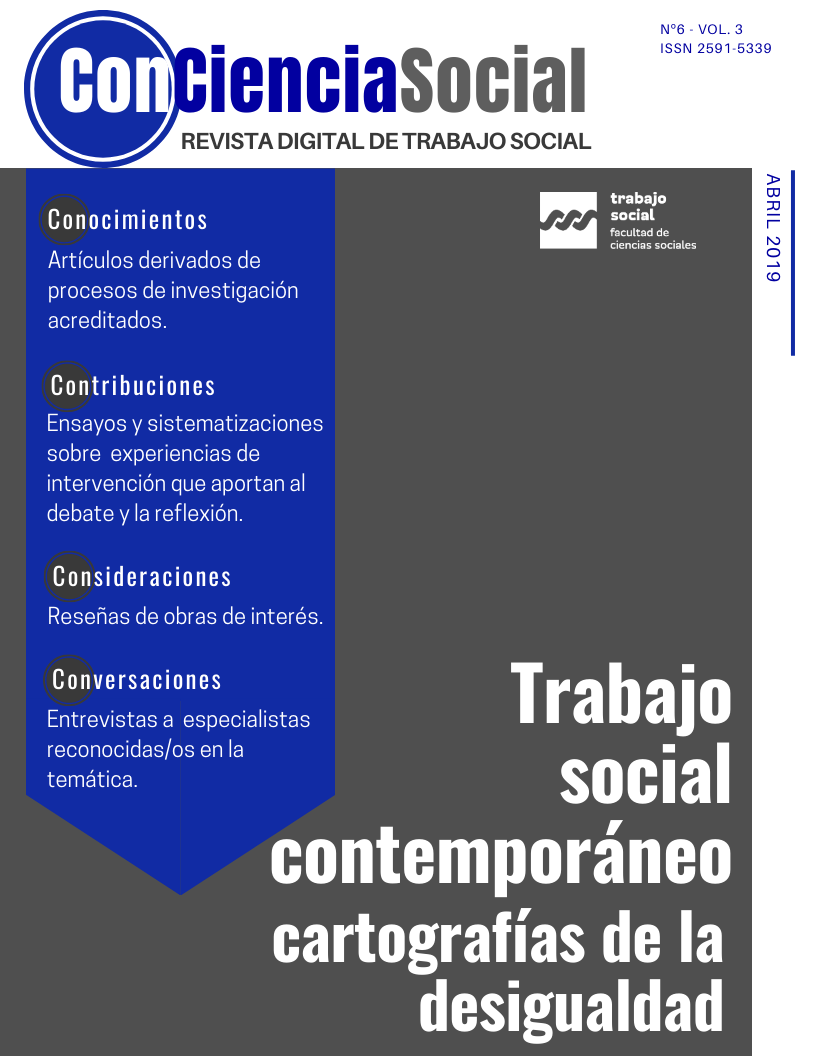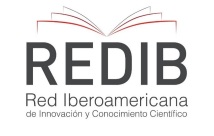Editorial
Keywords:
editorial conciencia social, cartografias de la desigualdad, trabajo social contemporáneoAbstract
When we launched the call to publish in the present issue, back in May of two thousand nineteen, we proposed to give an account, through the different productions, of the modifications produced in the living conditions of the subjects with whom we developed our intervention, and also of the modifications produced in our professional practice, since the establishment in Argentina of the third neoliberal wave. We know that the management of neoliberal governments unfailingly favors the interests of concentrated economic groups, to the detriment of the living conditions of the majority of the population. Thus, inequality is increasing, whether it is considered in regional, provincial or social terms. And this is true wherever and whenever neoliberalism is imposed as a socio-political model.
The appearance of number 6 of Social Science, already averaging the year 2020, finds us -and this is central for the social sciences and particularly for social work- facing the profound consequences of a process of exclusionary modernization, which was rejected through the popular vote on October 27, 2019. Exclusion is based on a strong attack against acquired economic and socio-cultural rights, an attack that was made concrete through the closure of strategic state areas from the point of view of guaranteeing rights; through massive layoffs - which at the state level were associated with political persecution and at the private level with the need to discipline the workforce in order to guarantee the lowering of salaries. In summary, a scenario has been configured that has destroyed the inalienable rights of Argentine society, such as public education, the right to work, health, truthful information, freedom of expression, freedom of association and political participation. This is a regressive process that has already been tried on different occasions in our country, always with the same results: impoverishment, loss of rights and awareness of our rights.
The present moment illuminates us with a dim light, which can be interpreted as either sunset or sunrise. In fact, neither of the two possibilities is guaranteed. However - and as a permanent and majority bet in the field of Social Work - we want to push for the dawn.
In this perspective, the professionals that intervene in the social question can build a horizon that guides their practices. In it, the recognition that ours is at the same time a distributive and cultural practice occupies an important place. In the first dimension, we have the possibility of distributing use goods, with no other restrictions than those imposed by the context. And as a cultural practice, it is necessary to develop a discursive struggle that confronts aporophobia -hate towards the poor-; and secondly, to confront the rejection of social protection policies that predominate in common sense.
From this point of view, we define ourselves by what Habermas calls the emancipatory interest that structures the critical sciences. Emancipatory interest is aimed, both subjectively and socially, at breaking, in what is within our reach, with the different forms of domination, and has emancipation as its horizon. As María Inés Peralta points out in her article for this issue, the emancipatory interest needs the exercise of criticism, which ... " must be recovered, treasured, activated, updated in the light of what the current social practices summon us to think". This definition requires encouraging and renewing interest in the ethical dimension, both in training processes and in professional practice, overcoming the idea of ethics as a set of prohibitions and permissions, and facing it as a privileged space of inquiry about the social meaning of our professions, and the scope of our freedoms and responsibilities in our condition as professionals. And if this interest is addressed collectively, so much the better.
Our practices and representations cannot be separated from their conditions of possibility: our analyses, our proposals, our criticisms, are inscribed in the conditions that geography and historical time exert on us. Historical time seems to be changing. Let us try to live up to this change. In terms of Michele de Certeau, let us be at the same time voyeurs and walkers, let us not grow old, let us continue to invent hour after hour the act of challenging the future.
References
-
Downloads
Published
Issue
Section
License
Aquellos autores/as que tengan publicaciones con esta revista, aceptan los términos siguientes:Los autores/as conservarán sus derechos de autor y garantizarán a la revista el derecho de primera publicación de su obra, el cuál estará simultáneamente sujeto a la Licencia de reconocimiento de Creative Commons que permite a terceros:
Compartir — copiar y redistribuir el material en cualquier medio o formato
Adaptar — remezclar, transformar y construir a partir del material para cualquier propósito, incluso comercialmente.
La licenciante no puede revocar estas libertades en tanto usted siga los términos de la licencia.Los autores/as podrán adoptar otros acuerdos de licencia no exclusiva de distribución de la versión de la obra publicada (p. ej.: depositarla en un archivo telemático institucional o publicarla en un volumen monográfico) siempre que se indique la publicación inicial en esta revista.
- Se permite y recomienda a los autores/as difundir su obra a través de Internet (p. ej.: en archivos telemáticos institucionales o en su página web) después del proceso de publicación, lo cual puede producir intercambios interesantes y aumentar las citas de la obra publicada. (Véase El efecto del acceso abierto).
Los derechos de explotación comercial (Copyrigth) quedan reservados para los autores.













